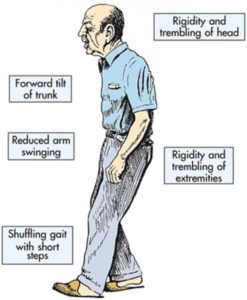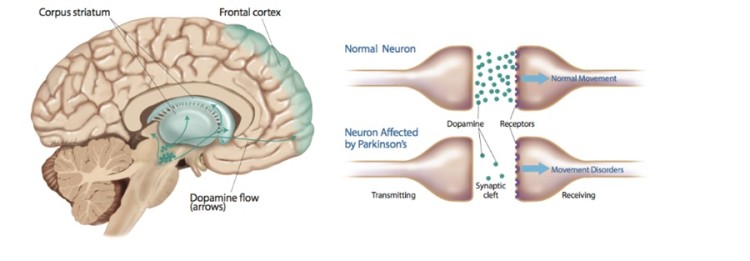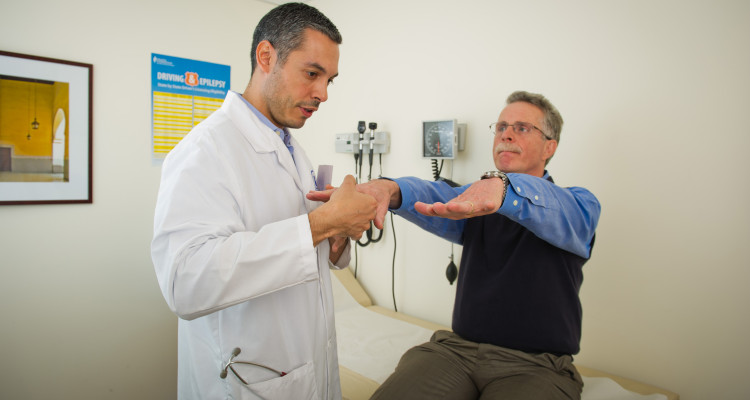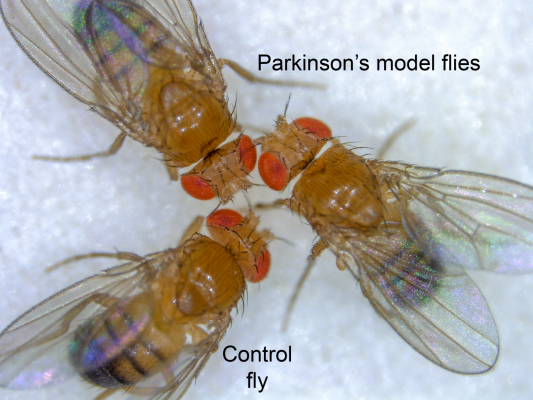
It’s thought around 1 in 500 people are affected by Parkinson’s disease, which means there are an estimated 127,000 people in the UK with the condition. Men are slightly more likely to get Parkinson’s disease than women.
Most people with Parkinson’s start to develop symptoms when they’re over 50, although around 1 in 20 people with the condition first experience symptoms when they’re under 40. Sadly, Because of population growth and an increasingly ageing population, the estimated prevalence and incidence of Parkinson’s in the UK is expected to grow. However, as we shall see later in this article, treatment is available to help maintain a quality of life. And there is new hope as scientists believe they are the right track to slow the condition right down, or stop it altogether!

What is Parkinson’s disease?
Parkinson’s disease affects the way you move. It happens when there is a problem with certain nerve cells in the brain.
Normally, these nerve cells make an important chemical called dopamine. Dopamine sends signals to the part of your brain that controls movement. It lets your muscles move smoothly and do what you want them to do. When you have Parkinson’s, these nerve cells break down. Then you no longer have enough dopamine, and you have trouble moving the way you want to.
Parkinson’s is progressive, which means it gets worse over time. But usually this happens slowly, over many years. And there are good treatments that can help you live a full life.

What are the symptoms of Parkinson’s?
The three main symptoms of Parkinson’s disease are:
- involuntary shaking of particular parts of the body (tremor)
- slow movement
- stiff and inflexible muscles
A person with Parkinson’s disease can also experience a wide range of other physical and psychological symptoms, including:
- depression and anxiety
- balance problems – this may increase the chance of a fall
- loss of sense of smell (anosmis)
- problems sleeping (insomnia)
- memory problems
Tremor may be the first symptom you notice. It’s one of the most common signs of the disease, although not everyone has it.
More importantly, not everyone with a tremor has Parkinson’s disease.
Tremor often starts in just one arm or leg or on only one side of the body. It may be worse when you are awake but not moving the affected arm or leg. It may get better when you move the limb or you are asleep.
In time, Parkinson’s affects muscles all through your body, so it can lead to problems like trouble swallowing or constipation.
In the later stages of the disease, a person with Parkinson’s may have a fixed or blank expression, trouble speaking, and other problems. Some people also lose mental skills (dementia).
People usually start to have symptoms between the ages of 50 and 60. But sometimes symptoms start earlier.

What causes Parkinson’s disease?
Parkinson’s disease is caused by a loss of nerve cells in part of the brain called the substantia nigra. This leads to a reduction in a chemical called dopamine in the brain.
No one knows for sure what makes these nerve cells break down. But scientists are doing a lot of research to look for the answer. They are studying many possible causes, including aging and poisons in the environment.
Abnormal genes seem to lead to Parkinson’s disease in some people. But so far, there is not enough proof to show that it is always inherited.
How is Parkinson’s disease diagnosed?
Your doctor will ask questions about your symptoms and your past health and will do a neurological exam. This exam includes questions and tests that show how well your nerves are working. For example, your doctor will watch how you move, check your muscle strength and reflexes, and check your vision.
Your doctor will also ask questions about your mood.
In some cases, your doctor may have you try a medicine. How this medicine works may help your doctor know if you have Parkinson’s disease.
There are no lab or blood tests that can help your doctor know whether you have Parkinson’s. But you may have tests to help your doctor rule out other diseases that could be causing your symptoms. For example, you might have an MRI to look for signs of a stroke or brain tumour.

Treatment
Although there’s currently no cure for Parkinson’s disease, treatments are available to help reduce the main symptoms and maintain quality of life for as long as possible.
These include:
- supportive treatments – such as physiotherapy and occupational therapy
- medication
- in some cases, brain surgery
You may not need any treatment during the early stages of Parkinson’s disease, as symptoms are usually mild. However, you may need regular appointments with your specialist so your condition can be monitored.

How will Parkinson’s disease affect your life?
Finding out that you have a long-term, progressive disease can lead to a wide range of feelings. You may feel angry, afraid, sad, or worried about what lies ahead. It may help to keep a few things in mind:
- Usually this disease progresses slowly. Some people live for many years with only minor symptoms.
- Many people are able to keep working for years. As the disease gets worse, you may need to change how you work.
- It is important to take an active role in your health care. Find a doctor you trust and can work with.
- Depression is common in people who have Parkinson’s. If you feel very sad or hopeless, talk to your doctor or see a counsellor.
- It can make a big difference to know that you’re not alone. Ask your doctor about Parkinson’s support groups, or look for online groups or message boards.
- Parkinson’s affects more than just the person who has it. It also affects your loved ones. Be sure to include them in your decisions.
Outlook
As the condition progresses, the symptoms of Parkinson’s disease can get worse and it can become increasingly difficult to carry out everyday activities without assistance.
Many people respond well to treatment and only experience mild to moderate disability, whereas the minority may not respond as well and can, in time, become more severely disabled.
Parkinson’s disease doesn’t directly cause people to die, but the condition can place great strain on the body, and can make some people more vulnerable to serious and life-threatening infections.
However, with advances in treatment, most people with Parkinson’s disease now have a normal or near-normal life expectancy.

The team from the MRC Toxicology Unit at the University of Leicester. Credit: University of Leicester
– Dr Miguel Martins (second to right) –
New research may help future sufferers be cured!
A new study has given hope to millions of sufferers around the world that a breakthrough drug may be on the horizon.
Scientists believe they have discovered that Parkinson’s disease is caused in a different way than previously thought and also a possible new way of treating the severely debilitating condition.
Charity Parkinson’s UK said the research could lead to a new drug that could “slow or stop the condition in its tracks”.
It was believed Parkinson’s occurs when mitochondria – which supply power to cells – malfunctioned, causing brain cells that produce the key hormone dopamine to die.
But Leicester University researchers found most of the problem related to another part of the cell, called the endoplasmic reticulum (ER), they reported in the journal Cell Death and Disease.
In a study with fruit flies that had been genetically modified to develop Parkinson’s, the scientists managed to at least partially correct the problem so that the number of brain cells increased and the flies’ muscles remained healthy.
One of the researchers, Dr Miguel Martins, said: “This research challenges the current held belief the Parkinson’s disease is a result of malfunctioning mitochondria.
“By identifying and preventing ER stress in a model of the disease it was possible for us to prevent neurodegeneration.

“While the finding so far only applies to fruit flies, we believe further research could find that a similar intervention in people might help treat certain forms of Parkinson’s.”
Claire Bale, head of research communications at Parkinson’s UK, said: “This research provides new insights into the significance of the role of the endoplasmic reticulum (ER) and the potential order of events that happens when a brain cell starts to malfunction and die.
“Identifying a way to prevent losing precious dopamine-producing cells in a fly model could translate to new and better treatments for Parkinson’s.”
Some great news for sufferers and their families indeed.
If you suspect you are displaying signs of Parkinson’s disease, make an appointment with Medcare’s GP. Call on 966 860 258 or email doctors@medcarespain.com
